


Philosophical musings on Quanta & Qualia; Materialism & Spiritualism; Science & Religion; Pragmatism & Idealism, etc.



 NEXT
NEXT
 BACK
BACK
Glossary Hints :
Glossary terms are indicated in the blog text by the dark blue color : BothAnd
A click on the linked term will take you to the glossary definition.
For more information on technical terms, go to the indicated links, both internal and external
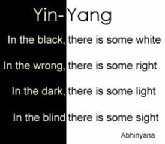







GLOSSARY OF TECHNICAL TERMINOLOGY
|
Hegelian Dialectic :
A theory of historical development that is often attributed to the philosopher G.W.F. Hegel. It proposes that cultural understanding progresses, despite conflicts, via 3 stages labeled Thesis (a dominant cultural worldview or “-Ism”), followed by Antithesis (an opposing view), then to Synthesis (a blend of the prior views). Stage 3 then becomes the thesis for the next round of quarreling belief systems.
|
|
Historical Progression:
Georg Hegel introduced a system for understanding the history of philosophy and the world itself, often called the "dialectic" : a progression in which each successive movement emerges as a solution to the contradictions inherent in the preceding movement. http://www.age-of-the-sage.org/ philosophy/history/hegel_philosophy_history.html
|
|
Holism ; Holon :
Philosophically, a whole system is a collection of parts (holons) that possesses properties not found in the parts. That something extra is an Emergent quality that was latent (unmanifest) in the parts. For example, when atoms of hydrogen & oxygen gases combine in a specific ratio, the molecule has properties of water, such as wetness, that are not found in the gases. A Holon is something that is simultaneously a whole and a part — A system of entangled things that has a function in a hierarchy of systems. In the Enformationism worldview, our space-time physical reality is a holon that is a component of the enfernal G*D-Mind.
|
|
Idealism :
Scientific Materialism is the assumption that particle Physics is the foundation of reality, and that our ideas are simply products of material processes. Empirical Idealism doesn't deny the existence of a real world, but reasons that all we can ever know about that hypothetical reality is the mental interpretations of sensory percepts. Platonic Idealism (Myth of the Cave) calls those interpretations illusions, and asserts that true Reality is equivalent to an idea in the mind of God. Enformationism is compatible with both views, depending on your perspective. [ see IDEALITY below ]
|
|
Ideality :
In Plato’s theory of Forms, he argues that non-physical forms (or ideas) represent the most accurate or perfect reality. Those Forms are not physical things, but merely definitions or recipes of possible things. What we call Reality consists of a few actualized potentials drawn from a realm of infinite possibilities.
1. Materialists deny the existence of such immaterial ideals, but recent developments in Quantum theory have forced them to accept the concept of “virtual” particles in a mathematical “field”, that are not real, but only potential, until their unreal state is collapsed into reality by a measurement or observation. To measure is to extract meaning into a mind. [Measure, from L. Mensura, to know; from mens-, mind]
2. Some modern idealists find that scenario to be intriguingly similar to Plato’s notion that ideal Forms can be realized, i.e. meaning extracted, by knowing minds. For the purposes of this blog, “Ideality” refers to an infinite pool of potential (equivalent to a quantum field), of which physical Reality is a small part. A formal name for that fertile field is G*D. [ see CHAOS ]
|
|
Information :
Knowledge and the ability to know. Technically, it's the ratio of order to disorder, of positive to negative, of knowledge to ignorance. It's measured in degrees of uncertainty. Those ratios are also called "differences". So Gregory Bateson* defined Information as "the difference that makes a difference". The latter distinction refers to "value" or "meaning". Babbage called his prototype computer a "difference engine". Difference is the cause or agent of Change. In Physics it’s called "Thermodynamics" or "Energy". In Sociology it’s called "Conflict". [ see INFORMATION at left; see EnFormAction ]
*http://www.informationphilosopher.com/ . . . . /bateson/
|
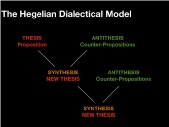

Various Views
of
Hegelian
Dialectic
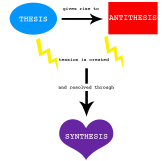

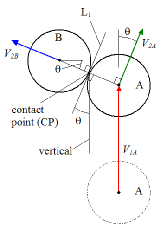
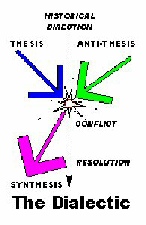
What is Information ?
The power to enform, to create, to cause change, the essence of awareness. . . . .
http://bothandblog6.enformationism.info/page16.html
Information is :
Claude Shannon quantified Information not as useful ideas, but as a mathematical ratio between meaningful order (1) and meaningless disorder (0); between know-ledge (1) and ignorance (0). So, that meaningful mind-stuff exists in the limbo-land of statistics, producing effects on reality while having no sensory physical properties. We know it exists ideally, only by detecting its effects in the real world.
For humans, Information has the semantic quality of aboutness , that we interpret as meaning. In computer science though, Information is treated as meaningless, which makes its mathe-matical value more certain. It becomes meaningful only when a sentient Self interprets it as such.
When spelled with an “I”, Information is a noun, referring to data & things. When spelled with an “E”, Enformation is a verb, referring to energy and processes.






 NEXT
NEXT
 BACK
BACK











